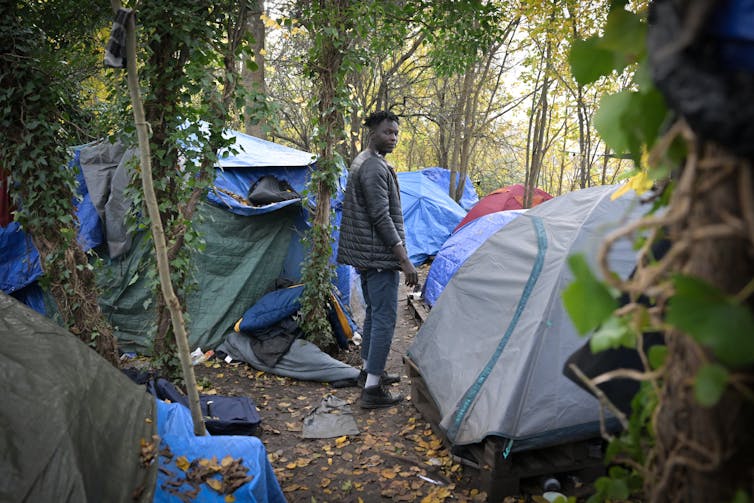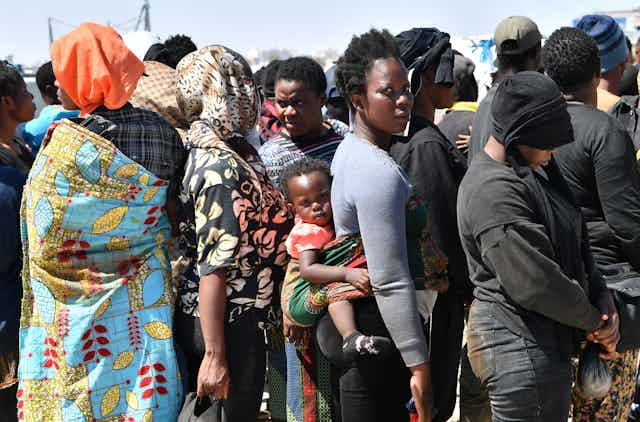It was everywhere on the news and social media. In September 2023, 10,000 migrants arrived on the island of Lampedusa, more than doubling the island’s population of 6,000 and overwhelming its resources. The migrants – mostly men from sub-Saharan Africa and the Middle East – had to sleep outside, with the island’s reception centre only designed for 400 people.
Days after, Italy’s Prime Minister, Georgia Meloni, visited the island with European Commission chief Ursula von der Leyen, who presented a ten-point plan to stem the migrant flow. These included calls to “increase awareness and communication campaigns to disincentivise the Mediterranean crossings” and to “step up cooperation with the United Nations High Commissioner for Human Refugees (UNHCR) and the International Organisation for Migration (IOM)”.
Notwithstanding the fanfare with which these announcements were made, their methods were hardly new.
A leading actor in the field, the IOM has been organising such campaigns for decades. One of the most notable ones was “Migrants as Messengers”, which took place across Senegal, Guinea and Nigeria from December 2017 to March 2019. Throughout the campaign, town halls screened video testimonies of migrant returnees, followed by Q&As with migrants who would act as “messengers” to deter them from embarking onto the perilous journey.
In 2022, the UNHCR also launched the “Telling the Real Story” campaign across a number of African countries. Drawing mainly on a website and a Facebook page, the campaign aims at “telling the real story” by emphasising the terrible ordeals that await would-be irregular immigrants, such as human smuggling and trafficking.
The argument is always the same: would-be emigrants in Africa are unaware of the risks and must be informed so that they make the right decision – which is to stay at home or migrate only if they have the right to do so. This message is complemented by information on the opportunities in the country of origin and on Africans’ duty to contribute to the development of their country.
Read more: Sauvetage des migrants-naufragés en Méditerranée : comment la politique de l’UE doit évoluer
Hundreds of campaigns
According to a report from the European research programme “Bridges”, the EU has spent more than €23 million since 2015 to organise nearly 130 information campaigns.
While Europe is at the forefront of such initiatives, it is not alone. Australia has distinguished itself with particularly biting messages, with a 2014 campaign directly addressing people tempted by irregular immigration in stark terms: “NO WAY. You will not make Australia home”. Years later, in 2019, the strategy was enthusiastically touted by the then US president, Donald Trump.
Campaigns can also be organised by private companies or NGOs. For example, the social enterprise Seefar carried out an extensive information campaign on the risks of migration in Senegal in 2021, reaching 1,987 young people across the country, according to the organisation. In addition to its rescue missions in the Mediterranean, the Spanish association Proactiva Open Arms also ran an awareness campaign in the same country, the “Origin” project.
However, all these initiatives and players are faced with a major problem: no one is able to demonstrate the effectiveness of these campaigns.
Read more: Le sauvetage en mer au défi de la sécurisation des frontières : le cas de la Manche
Difficult to assess effectiveness
As the budgets devoted to them increase, however, some studies have begun to take a serious look at the impact of campaigns.
In 2018, an IOM study pointed out that campaigns are difficult to evaluate because they have a dual objective: to slash irregular immigration, but also to provide information.
Sometimes only one of the two objectives is achieved: in 2023, a study devoted to the IOM’s “Migrants as Messengers” showed that this campaign did increase the level of information, while failing to reduce departures.

Overall, although it has been organising such campaigns for 30 years, the IOM has carried out only a few, belated impact studies. This is because seriously gauging campaigns’ effectiveness is expensive – but it also appears that European states prefer to multiply campaigns rather than fund evaluations.
The situation is even more confusing with other actors. Seefar, for example, claims that, in follow-up interviews, 58% of its campaign viewers reported having given up their migration project. But in the absence of basic information regarding this finding, like the number of interviews or the timeline over which interviewees were followed, it is difficult to know whether this is more than a wet-finger approach to justify the funds received by this private company.
In terms of independent research, a study by the Institute for Social Research in Oslo in 2019 looked at migrants from Eritrea, Somalia and Ethiopia in transit through Sudan with the intention of continuing on to Europe.
The aim was to evaluate a campaign launched in 2015 by Norway, entitled “Stricter asylum regulations in Norway”, which used Facebook to inform potential migrants of the slim chances of obtaining asylum in that country. As with any advertisement, Facebook’s algorithm was designed to identify Internet users searching for information on immigration, Europe or visas, and to offer them targeted deterrent messages.
The study confirmed that migrants are connected and use social networks to obtain information and organise their migration. But while they have sometimes heard of European campaigns, most have not seen them. They know about the terrible living conditions of migrants in Libya, for example, but this does not dissuade them from leaving to escape the impasse of their situation.
Migrants deported from Europe called to testify
In 2023, a team of political scientists from the Vrije Universiteit Brussel analysed the information available to young people tempted to emigrate from the Gambia to Europe, and how the campaigns affected their decision to leave. As in Sudan, the information on the risks of irregular immigration happened to correspond to what these young people already know. But in the absence of prospects at home, they will leave anyway, fully aware of the facts.
Another study carried out with Afghans in transit through Turkey came to similar conclusions.
However, this work also revealed another problem: the recipients of these campaigns do not take them seriously because they believe them to be biased by Europe’s political objectives – and so they prefer to get their information from relatives, or even smugglers.

This result has prompted new strategies. Following the example of “Migrants as Messengers”, campaigns known as “peer to peer” (“de pair-à-pair”) ask migrants expelled from Europe to talk about their experience to those who might be tempted to imitate them. This is part of a technique known as “unbranding”, a marketing concept that refers to the omission of the brand name on a product in order to sell it better. In the case of the campaigns, this amounts to concealing the European and international institutions that fund them.
Another strategy is not to target potential migrants, but the local actors who influence perceptions of migration, starting with the media and artists. The International Organisation for Migration (IOM) works with musicians popular with young Africans, as well as with journalists.
Similarly, Unesco trains Senegalese journalists to talk about migration.
Trade-offs with freedom of expression
Against a backdrop of precariousness for media and cultural professionals, the support of international organisations is welcome, but raises the question of freedom of expression and freedom of the press on this politically sensitive subject.
In Morocco, the Network of Moroccan Journalists on Migration has been set up to deal with migration issues independently, although this does not prevent these journalists from taking part in training activities organised by international organisations and supported by European funding.
In Gambia, a recent study highlighted the dilemmas faced by local journalists who are asked to spread messages about the dangers of immigration while trying to maintain their independence.
In the eyes of their advocates, these campaigns are justified on the grounds that the migrants who die in the Mediterranean are the victims of misleading information from smugglers. Providing information would therefore save lives. But there are no studies to support this hypothesis: on the contrary, it appears that migrants leave in the full knowledge of the risks they are exposing themselves to.
Faced with this uncomfortable reality, it is possible that information campaigns only serve to give European leaders the feeling that they are acting to prevent the tragedies that result from their own policies. After all, it is partly due to a lack of opportunities to migrate legally that many migrants try their luck irregularly, with all the risks that this entails.
The scarcity of available evaluations shows that the effectiveness of the campaigns is not a priority for European states. This migration policy tool would therefore have primarily symbolic value – as proof that Europe is concerned about the fate of the many people it does not want on its soil.
But this political strategy nonetheless has very real effects on local players, and on the ability of societies in the South to debate independently the major political issues raised by international migration.


